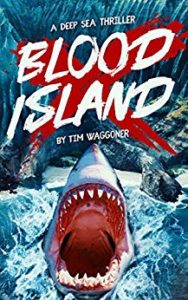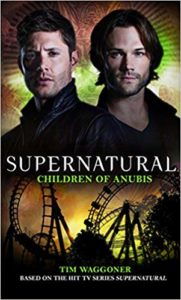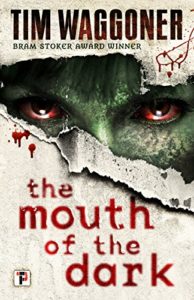An Interview with Tim Waggoner
 At the top of Dayton-area writer Tim Waggoner’s website is a quote from Dayton.com that reads: “Stephen King meets Franz Kafka.” To be compared to two literary greats like those is quite an accomplishment, but Tim seems to take it all in stride. I met him once at a LitSalon for the Antioch Writers’ Workshop, where I was immediately struck by his confidence and his congeniality. These traits lend themselves well to teaching, something he’s been doing for quite a while at Sinclair College and elsewhere. His work has won multiple awards, including the Bram Stoker Award for Superior Achievement in Long Fiction, and he’s been a finalist for the Scribe Award and the Shirley Jackson Award. With as busy as Tim Waggoner is, I’m thankful that he had time to answer a few of my questions.
At the top of Dayton-area writer Tim Waggoner’s website is a quote from Dayton.com that reads: “Stephen King meets Franz Kafka.” To be compared to two literary greats like those is quite an accomplishment, but Tim seems to take it all in stride. I met him once at a LitSalon for the Antioch Writers’ Workshop, where I was immediately struck by his confidence and his congeniality. These traits lend themselves well to teaching, something he’s been doing for quite a while at Sinclair College and elsewhere. His work has won multiple awards, including the Bram Stoker Award for Superior Achievement in Long Fiction, and he’s been a finalist for the Scribe Award and the Shirley Jackson Award. With as busy as Tim Waggoner is, I’m thankful that he had time to answer a few of my questions.
Christina: To say you are prolific is an understatement; I think your list of publishing credits on your website overwhelmed me! Where do you find the inspiration to write all these stories? And how do you make sure that each story is unique?
Tim: My brain has been full of ideas my entire life. Sometimes it’s not a matter of finding inspiration so much as trying to sort through all the ideas swirling around in my mind to find a really good one. Most of my ideas come from my response to the world around me. When you walk in the world as an imaginative person, you notice all kinds of weird things, and you wonder at their origins and possible (hidden) meanings. For example, years ago, in the space of a week, I saw two different men walking backward at two different locations. I had no idea why these men would be walking backward. It was so strange! I wrote a note about it on my phone’s notepad app, and sometime later, when I was searching for a story idea to use for an anthology, I read over my list of ideas and found “The Backward-Walking Man.” I used that image as the basis for the story.
I try to make my stories unique – both from each other and from what other people write – in several ways. One is by drawing inspiration from the world around me, as in the above example. I was likely the only person on Earth who saw those two men in that week and wrote it down in his phone. Then I combined it with another idea, one that at first might not seem to fit. The anthology I was writing the backward-walking men story for was Heroes of Red Hook. The book’s concept was Lovecraftian fiction featuring diverse heroes. I made the backward-walking men into one man, and I chose a young autistic man as my hero. His special perception of the world allowed him not only to see the Backward-Walking Man – who was walking backward as he unmade reality – but to defeat him.
I also try to make sure each story has an emotional core. For “The Backward-Walking Man,” the emotional core is that my hero has been treated all his life as if something’s wrong with him, that he’s lesser. But through the events of the story, he realizes the way he looks at life is special and valuable, and so is he.
So I guess my story formula would be Weird Observation + Seemingly Unrelated Idea + Emotional Core. If I can nail down those three things, I can usually come up with what I hope is a decent story.
Christina: You teach at Sinclair Community College in Dayton, Ohio. What do you like best about teaching? What do you like the least? And why did you choose to teach at the community college level instead of at a four-year university?
Tim: I love writing and I love helping people, so teaching composition and creative writing combines my two primary loves. I especially enjoy helping composition students who’ve always believed they were bad writers realize that they’re better than they thought. I enjoy helping them find confidence in their writing and themselves. When I first started teaching, I ran across the old cliché that you learn just as much about your subject, if not more, than your students by teaching it, and it’s true. I’m a much better writer now than I ever could’ve been if I’d never taught. I find teaching at a community college satisfying because the focus is on teaching – on helping people – instead of on producing research. As far as I’m concerned, the purpose of my college is to hook me up with students I can teach so I don’t have to go looking for them. Community colleges are open-access institutions, so there’s a lot of diversity, and I enjoy that as well. I’ve met so many different people from so many different places and backgrounds. That’s helped me tremendously as a writer.
There’s not much about teaching I don’t like. There are minor annoyances – lame student excuses, repetitive grading – but I am always happy to step into a classroom and get to work.
Christina: Your work has won plenty of awards over the years. Which award are you most proud of?
Tim: The Horror Writers’ Association Mentor of the Year Award is special to me because helping other writers – both formally and informally – is so important to me. The Bram Stoker Award is special to me because the award is an acknowledgement from your peers that you’re doing good work. And since horror is my absolutely favorite genre, the Bram Stoker Award is like an Oscar to me!
Christina: D. Harlan Wilson once wrote of your book, Deep Like the River: “Waggoner is a divine force in contemporary writing. Every new book of his I read takes me down dark and unruly passageways that bristles my fur and rattles my chains in ways that I didn’t think possible. “What rattles your chains? Has anything you’ve written ever scared you?
Tim: I’ve never been scared by anything I write, but a theme that appears in my fiction quite a lot is the idea of entropy, how existence will ultimately wind down to nonexistence, and how everything we do – even the smallest of actions – increases entropy and hastens the heat death of the universe, and there is absolutely nothing we can do about it. Wrestling with that concept is like trying to come to terms with death on a cosmic scale. My horror fiction is never about Good vs Evil. It’s about Entropy and how we find a way (or not) to live with our knowledge of it. This concept doesn’t scare me, exactly, but it is one I feel compelled to explore.
Christina: In an article on your website you shared that “Good horror – like all fiction that truly matters – is about affecting readers emotionally.” What authors have affected you emotionally, and what have you learned from them?
Tim: I’m fifty-five now, and I first read Stephen King when I was in my early teens. Up to that point, I’d read a ton of horror comics and watched a zillion horror movies, but the people in those stories were often interchangeable ciphers, existing only to, as my friend Gary A. Braunbeck puts it, “Get slurped by the Glop.”
But the characters in King’s fiction were so much better developed than any I’d ever encountered in horror before. They seemed like real people leading real lives until something nasty came along to disrupt those lives. Even the characters who were going to get slurped by the Glop had their moment on the stage before they were forced to exit. King gave even these characters their dignity, tried to make their deaths meaningful. Not only did his fiction affect me emotionally in a way horror never had before, it taught me the importance of having empathy for all of your characters.
Christina: What is your writing Kryptonite?
Tim: I used to find it extremely difficult and frustrating to write action scenes, but I’ve written so many over the years that I’ve grown more comfortable composing them. They still don’t feel completely natural to me, though. Sometimes it’s an effort to find my way into a story, to find the right voice, the right feel, that a particular piece of fiction needs. Once I find those things, it feels like I’ve discovered the key to unlocking the story, and the writing goes pretty smoothly after that. But getting to that point can be a real challenge sometimes.



Thanks to Tim for agreeing to this interview! If you know of an author who’d like to be featured in an interview (or you are an author who would like to be featured), feel free to leave a comment or email me via my contact page.
